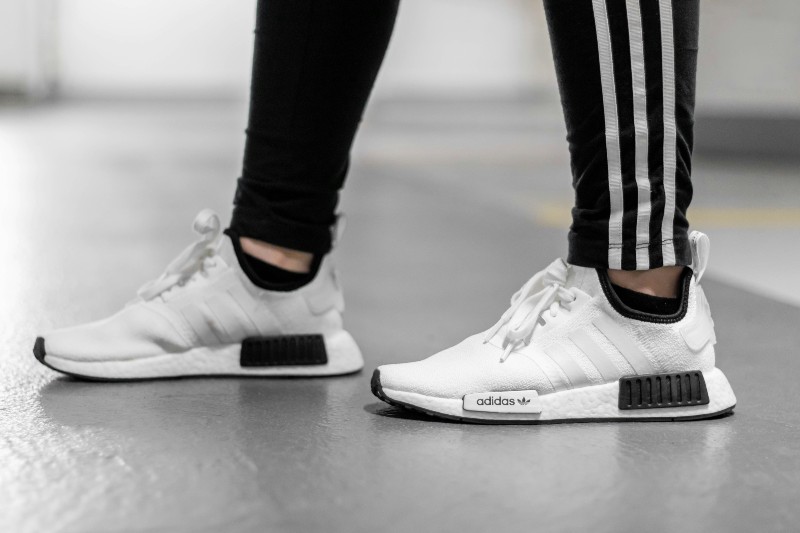When your shoes begin to squeak on tile floors, it can be quite noisy. The best way to stop this from happening is to first find out why your shoes are squeaking. Once you know the reason, you can then find the right way to fix it.
No matter if your shoes are brand new or old, there’s a reason they make that high-pitched noise on tile floors.
Here are the common 7 reasons and how to silence them effectively (we provide 3 ways for each reason).
1. Slick Bottoms
If the bottoms of your shoes are very smooth, walking on a shiny tile floor might make your steps sound like music.
Why does this happen? When the smooth rubber of your shoe soles meets a similarly smooth tile surface, there may not be enough friction to prevent sliding. This causes a vacuum effect or stick-and-slip movement, then makes a noise.
You can see it in sneakers or sports shoes, which usually have thick rubber soles, so they can squeak loudly on smooth indoor tile surfaces.
How To Stop Shoes From Squeaking On Tile Caused By Slick Bottoms
1. Scuff the Soles: One of the easiest ways to address the issue is by scuffing the bottoms of the shoes slightly to create more texture. Doing this can be as simple as walking on concrete or using a piece of sandpaper to gently roughen the soles.
2. Use a Rubber Spray: For a more uniform approach, consider using a rubber spray designed for shoes. This adds a thin layer of textured rubber to the sole, increasing friction and reducing the likelihood of squeaking on tile floors.
3. Apply Grip Pads: If you’re not keen on altering the soles directly, adhesive grip pads can be a viable alternative. These pads stick to the bottom of your shoe and provide extra traction without the need for scuffing or spraying.
2. Trapped Moisture
The cause of that annoying squeak could be as simple as moisture. When water finds its way between the insole and the outer sole, it can create a squeaky sound due to the friction generated as you walk, which is amplified on tile floors due to the hard, smooth surface.
This situation is common in waterproof/water-resistant shoes because they are designed to keep moisture out, but this can also mean they trap moisture inside more easily, especially between different layers of the shoe. Squeaks can happen when moisture trapped in shoes gets squished against hard floors like tile.
How To Stop Shoes From Squeaking On Tile Caused By Trapped Moisture
1. Remove and Dry the Insoles: Take out the insoles and allow them to dry thoroughly. If possible, place them in a warm, well-ventilated area to speed up the drying process.
2. Use Baby Powder or Baking Powder: Before replacing the insoles, sprinkle baby powder or baking powder inside your shoe, which will help absorb any residual moisture and reduce friction between the shoe and the insole.
3. Air Them Out: After wearing your shoes, especially if you’ve been caught in the rain or sweat a lot, let them air out instead of putting them away immediately. This prevents moisture buildup.
3. Grippy Surface
While it might seem not obvious, having too much grip can also cause shoes to squeak on the tile. The squeaking sound can happen because the bottom of your shoe grips the tile and then suddenly lets go with each step you take. This quick stick-and-release action can make your shoes squeak.
How To Stop Shoes From Squeaking On Tile Caused By Grippy Surface
1. Use a Dryer Sheet: Rubbing a dryer sheet over the sole can reduce the amount of grip just enough to stop the squeak, without compromising your safety. The dryer sheet leaves a thin, waxy layer that adds smoothness.
2. Apply Sole Conditioner: Similar to leather conditioners for the upper part of the shoe, there are conditioners designed for rubber soles that reduce excessive grip. Follow the product instructions for the best result.
3. Use WD-40 or Silicone Spray: A quick fix for too much grip is to lightly spray the bottom of your shoes with WD-40 or a silicone spray. However, be cautious with this method- it’s vital to apply a very light layer to avoid making your shoes too slippery, which could lead to accidents. Always wipe off any excess product.
4. New Shoes
Fresh out of the box, new shoes might squeak against tile floors as they haven’t been broken in yet. The materials, especially in the sole, can be stiff and not as flexible, causing a squeak as you walk.
How To Stop Shoes From Squeaking On Tile Caused By New Shoes
1. Flex Them: One of the simplest ways to break in new shoes is by flexing them. Bend the shoes back and forth, focusing on the sole. This can help make them more flexible and reduce squeaking.
2. Wear Them In: Gradually increase the time you wear your new shoes indoors before taking them out. This can help the materials to soften and mold to your feet, reducing the chances of squeaking.
3. Use Conditioners: If your new shoes are made of leather, applying a leather conditioner can help soften them up. For rubber soles, consider using a rubber sole conditioner to increase flexibility. Always follow the product directions for the best results.
5. Worn-Out Soles
As shoes age, the soles can wear down unevenly, creating gaps where air or moisture can get trapped. When you walk, air or moisture might get pushed against the tile by your shoes, causing a squeak. This is more likely if your shoes are damaged, like if parts of the sole are missing or there are holes.
How To Stop Shoes From Squeaking On Tile Caused By Worn-Out Soles
1. Sole Repair: If just the sole of your shoe is worn out but the rest looks good, think about getting it fixed or replaced at a shoe repair shop. This can make your favorite shoes like new again and stop any squeaking from wear.
2. Fill Gaps: For minor wear, products such as Shoe Goo can be used to fill gaps in the sole. This not only stops the squeak but can extend the life of your shoes. Be sure to let it cure fully according to the product’s instructions before wearing the shoes again.
3. Use Inserts: Sometimes, placing a new insole or insert inside the shoe can provide a temporary buffer that minimizes squeaking. It isn’t a permanent solution but can work well if the sole is only slightly worn or if you’re not ready to replace the shoes just yet.
6. Inadequate Support
Another less obvious reason for shoe squeaks on tile could be the lack of adequate support within the shoe. When shoes do not properly support your foot, it can lead to uneven pressure distribution as you walk, causing parts of the shoe to rub together or against the floor in a way that creates a squeaking sound.
How To Stop Shoes From Squeaking On Tile Caused By Inadequate Support
1. Upgrade Your Insoles: Investing in high-quality, supportive insoles can rectify issues of inadequate support. Look for insoles that match your foot arch and provide a cushioning effect to distribute pressure more evenly.
2. Adjust Your Lacing Technique: Sometimes, simply changing the way you lace your shoes can make a difference. For example, tightening your shoelaces in a snug pattern can give your foot more support, which might help stop the squeaking by reducing shoe movement.
3. Choose the Right Size: If your shoes are too big or too small, your foot might move or press inside them in odd ways, which can cause squeaks. Always ensure you’re wearing the right shoe size, and consider shoes that offer adjustable features, like hook-and-loop straps or laces that can be tightened or loosened as needed to achieve the best fit.
7. Material Mismatch
Sometimes, the interaction between different materials used in the shoe’s construction and the tile can lead to squeaking. For instance, certain synthetic materials may react with the smooth surface of tile floors more readily than natural materials, creating a higher likelihood of squeaking noises.
How To Stop Shoes From Squeaking On Tile Caused By Material Mismatch
1. Use Anti-Squeak Products: There are sprays and other products designed specifically to reduce or eliminate squeaking caused by material interactions. Look for ones that can be applied directly to the soles of your shoes.
2. Consider Shoe Covers: If you’re unable to modify the shoe itself, using a shoe cover made of a different material can provide a temporary solution. This is especially useful in environments where you cannot control the flooring, like at work or during events.
3. Select Footwear Wisely: For future purchases, consider how the materials of the shoes might interact with your most commonly encountered flooring. Opt for materials known to produce less friction with tile, such as leather or certain types of rubber.
Conclusion
Squeaky shoes can be more than just a minor annoyance, they can disrupt quiet environments and draw unwanted attention.
Understanding the different reasons shoes squeak on tile and using the right solutions can help you walk more quietly and without drawing attention.





